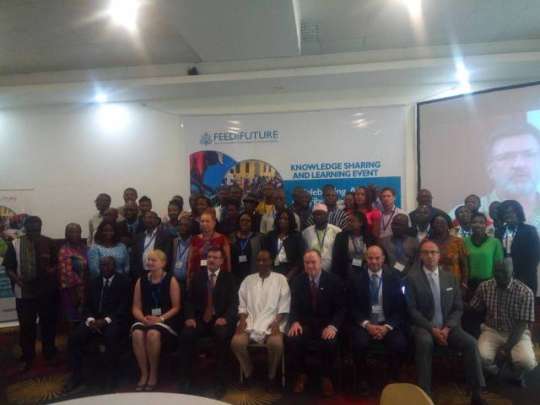USAID to partner Ghana on new food security strategy
- Posted on
- Comment
The United State Agency for International Development (USAID) says it will continue its strong partnership with government, the private sector and the civil society in the implementation of the new Global Food Security Strategy.
Mr Steven Hendrix, the Acting Mission Director USAID, who made the pledge, said the strategy for Ghana presented a five-year evidence-based integrated approach to reduce poverty, hunger and malnutrition through agriculture-led growth, resilience and nutrition.
Mr Hendrix was speaking at the Knowledge-Sharing and Learning forum to celebrate Ghana Agriculture Policy Support Project in Accra on Wednesday.
The event organised by the Ghana Feed the Future Agriculture Policy Support Project (APSP) brought together stakeholders to take account of the past five years of project implementation and also to share knowledge on the technical accomplishment and discuss lessons learnt.
The five-year Project was launched in 2013 to increase the capacity of the government, private sector and the civil society organisations to implement evidence-based policy formation, implementation, research and advocacy and to perform rigorous monitoring and evaluation of agricultural programmes implemented by the Medium Term Agriculture Sector Investment Plan.
He said Ghana’s Global Food Security Strategy country plan would adopt a two-pronged approach in its implementation process.
Mr Hendrix said the first strategy would be to continue to improve agriculture-led growth, resilience and nutrition in the Northern, Upper East and Upper West Regions, where poverty and nutrition statistics were poorest.
“Critical to Ghana’s food security, we will also support protection of Ghana’s marine fisheries in the coastal areas,” he said.
The Acting Mission Director also said the strategy would make selected investments targeting higher-value commercial crops across the country to support agricultural sector transformation through trade acceleration.
He said the two-pronged approach would allow Ghana to address its sub-national poverty and nutrition challenges, while bolstering its ability to manage and finance its strategic transition to self-reliance.
Dr Sagre Bambangi, Deputy Minister of Food and Agriculture in charge of Annual Crops, commended the leadership of USAID for their support in helping build the capacity of human resource in the Agriculture sector.
He said the Ministry was also aware of the assistance of the project to the Statistics, Research and Information Directorate of the Ministry of Food and Agriculture to modernise, collected and assembly agriculture data with computer assisted personal interview mobile data collecting system.
He said poor quality of seeds supplied by the seed producers have made farmers have a lot of doubt on the seeds supplied to farmers this year, which were only grains but were supplied as seeds.
He cautioned seed suppliers to desist from just putting grains together to deceived farmers of being it seed, adding that agriculture policies over the years have not paid adequate attention to seed terminology of the sector.
“We have relaxed in that area of the sector to produce quality seeds for good yield,” he added.
He commended the USAID for their support to the Seed Council in making sure the right and quality Seeds were produced.
Source: GNA











 (Selorm) |
(Selorm) |  (Nana Kwesi)
(Nana Kwesi)